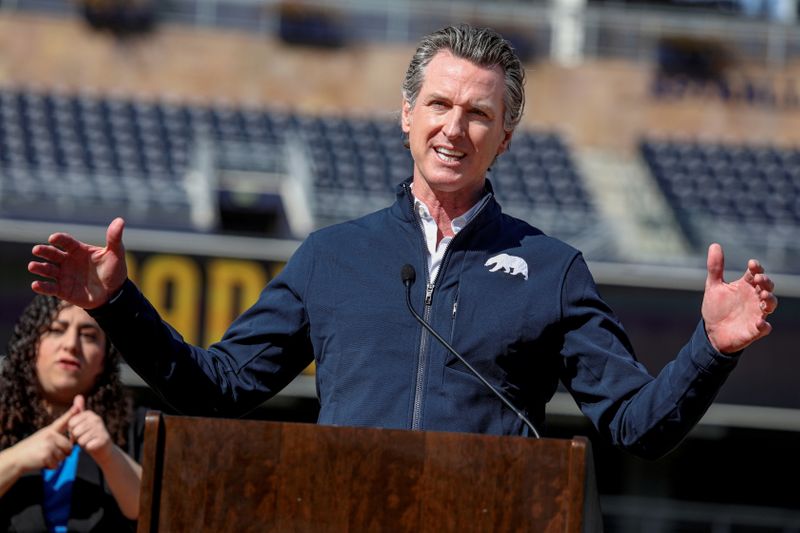By Sharon Bernstein
SACRAMENTO, Calif. (Reuters) - California Governor Gavin Newsom and his supporters are stepping up their fight against a Republican-backed recall with a barrage of door knocks, text messages and outreach to communities of color as opinion polls show the Democrat in danger of losing.
The group Voto Latino exclusively told Reuters it plans to spend about $1 million ahead of the Sept. 14 recall vote to try to persuade 600,000 young Latinos to cast ballots for Newsom, highlighting his need to spur more enthusiasm among Black and Latino voters.
Democrats outnumber Republicans in California more than two-to-one. President Joe Biden won the state by nearly 30 percentage points last year. Half of the state's registered voters and 91% of Democrats said in a July 27 poll by the University of California, Berkeley, Institute for Governmental Studies that they want to retain the first-term governor.
But a perfect storm of issues energizing Republicans - and complacency among Democrats who think the governor has it in the bag - has the recall election looking much closer than expected.
Like Democrats across the country, Newsom has taken heat throughout the COVID-19 pandemic from opponents of public health shutdowns, mask mandates and school closures. He also is grappling with a rise in cases of homelessness and homicides, extreme drought and devastating wildfires.
A successful recall would serve as a wake-up call for Democrats already facing the threat of losing their majorities in Congress in the 2022 U.S. midterm elections, said Democratic strategist Steven Maviglio.
Maviglio served as press secretary for Democrat Gray Davis, ousted as California's governor by Hollywood action star Arnold Schwarzenegger in the state's last recall in 2003.
Maviglio said Democrats must take the election seriously to avoid the same fate for Newsom, a former lieutenant governor and mayor of San Francisco.
"Democrats need a slap in the face to get off the sofa and fill out that form," he said.
TURNOUT KEY
The Patriot Coalition, a group angered by Newsom's policies on immigration and crime, spearheaded the effort to remove him. Their campaign gained steam as frustration mounted over Newsom's pandemic policies and a judge granted them extra time to get enough signatures to put the recall on a ballot.
Voters will be asked to make two separate decisions - whether Newsom should be removed, and who should replace him.
If Newsom is recalled, he will almost certainly be succeeded by a Republican with comparatively little statewide support. The winner needs only a plurality of votes to become governor, and just one little-known Democrat is among the replacement choices.
Conservative talk show host Larry Elder leads recent polls, followed by businessman John Cox and former San Diego Mayor Kevin Faulconer.
Newsom goes into the final weeks of the race with a war chest of more than $51 million, campaign finance records show, compared to about $6 million for those seeking to unseat him.
Keenly aware that turnout could decide the special election, Newsom's team is rolling out new daily messages predicting dire consequences for Democratic priorities such as abortion rights, immigration and other issues if he is removed from office.
A Friday rally with Vice President Kamala Harris, a former California senator, was canceled after a deadly attack outside the Kabul airport killed dozens of Afghans and 13 U.S. service members.
"There are no swing voters in this election," said Newsom adviser Nathan Click. "There's no one who's choosing between yes and no. The 'swing voters' are all Democrats who are choosing between voting and not voting."
Just 36% of registered voters told pollsters at the University of California, Berkeley, last month that they favored removing the governor, with 51% opposed.
But when researchers dug deeper, they found that very few Democrats were planning to vote - making the race exceedingly close with 47% of the most likely voters favoring the recall and 50% opposed.
"What we found was an astounding gap between likely and registered voters," said Eric Schickler, co-director of the institute that conducted the poll.
The state sent mail-in ballots to all Californians who are registered to vote. Data released last week showed Democrats had returned their ballots by a rate of two-to-one compared to Republicans, buoying Democrats' hopes that their voters were beginning to understand the stakes.
But analyst Paul Mitchell, whose firm Political Data studied the returns, said the early results could reflect Republicans' skepticism of voting by mail rather than heightened Democratic interest in the recall.
Former President Donald Trump's repeated false accusations that mail-in voting was rife with fraud caused a shift in voting tendencies among Republicans that others in his party are now trying to counter.
Political strategist Matt Shupe, the Republican Party chairman for Contra Costa County in the San Francisco Bay Area, said he sent 35,000 text messages last week to members urging them to return their ballots.
"They need to not be worried, and they need to go and mail in the ballots," he said.
Most of the ballots cast so far came from white voters, Mitchell's analysis found. Newsom also needs to persuade voters in communities of color to turn out if he wants to keep his job.
Groups including the African American Voter Registration, Education and Participation Project; Black Women for Wellness; the Chinese Progressive (NYSE:PGR) Association Action Fund; and the immigrant rights group CHIRLA are planning get-out-the-vote activities such as canvassing and phone banks.

Voto Latino, which targets voters ages 18 to 34, has sent out text messages and digital advertisements urging people to vote, said Ameer Patel, vice president of programs.
In coming days, he said, the messages will take on a more urgent tone, warning that voting rights, immigration and climate could be impacted if Newsom is replaced by a Republican.